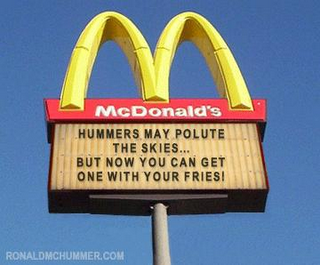I invite you to use the Ronald McHummer Sign-O-Matic™ to express what you think (the sign I created is the one you see here) of this misguided marriage of two icons of American excess.

This got me thinking about my hubby's car. MrMaple drives a great Volkswagen Jetta TDI which gets fabulous gas mileage (40-50 mpg). To increase the environmental savings, he is currently running on B20 biodiesel (80% petroleum diesel, 20% biodiesel), available at our local fuel station. For those of you not familiar with biodiesel, here is some information, coutesy of the National Biodiesel Board.
What is biodiesel?
Biodiesel is the name of a clean burning alternative fuel, produced from domestic, renewable resources. Biodiesel contains no petroleum, but it can be blended at any level with petroleum diesel to create a biodiesel blend. It can be used in compression-ignition (diesel) engines with little or no modifications. Biodiesel is simple to use, nontoxic, and essentially free of sulfur and aromatics. Biodiesel is as biodegradable as sugar and less toxic than table salt. It is also approved by ASTM standards, and registered as an alternative fuel by the EPA, DOE, and DOT.
How is biodiesel made?
Biodiesel is made through a chemical process called transesterification whereby the glycerin is separated from the fat or vegetable oil (including waste veggie oil, from say, a McDonald's frialator.) The process leaves behind two products -- methyl esters (the chemical name for biodiesel) and glycerin (a valuable byproduct usually sold to be used in soaps and other products).
According to the EPA, the following represents average B20 Biodiesel emissions as compared to conventional diesel:
Total Unburned Hydrocarbons -20%
Carbon Monoxide -12%
Particulate Matter -12%
Sulfates -20%
Waste Vegetable Oil
Let's take it a step further. According to Wikipedia, as of 2000, the United States was producing in excess of 11 billion liters of waste vegetable oil annually, mainly from industrial deep fryers in potato processing plants, snack food factories and fast food restaurants (are you listening McDonald's?). If all those 11 billion liters could be collected and used to replace the energetically equivalent amount of petroleum (a rather utopical case), almost 1% of US oil consumption could be offset.
So I'd like to challenge McDonald's to cease their Hummer Happy Meal campaign, and consider a new program featuring biodiesel (and their potential contibution to the effort) as a way to educate our youth on alternative fuel sources and, in the process, "clean" up their image a bit.
Updated: Sorry for reposts. Computer crashed mid-edits.

5 comments:
A biodiesel pump in every McDonald's parking lot.
Brialliant!
What a fantastic idea! Thanks for sharing, and you should definitely pass that gem along.
BTW, folks, I forgot to mention that Vermont author Greg Pahl has a great new book out on Biodiesel. Includes how to heat your home with it! Be sure to check it out!
And anonymous, if you are in the Vermont area, we should contact the VT Biodiesel Project, and propose this as their next pilot program!
uhhhh...ok I'm a total geek...so what's the first thing I saw in an "I type fro sh*t" sort of way? (forgive me!) Pollute has two L's. Sorry sorry sorry!!! I loev you! ~~AM
Oops! Oh well - what can I say...the sign maker didn't have spell check (my best friend!) Loev you anyhow!
I love the sign! I'm trying to think up my own now, but I'm not coming up with anything nearly as good.
Post a Comment